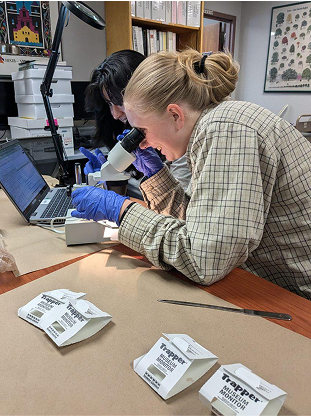About the Program

The PATH Program: Preserving Archives of Texas Heritage (PATH) is a collaborative initiative designed to build stewardship in cultural resource work while enhancing accessibility to archival and museum collections. This joint effort is carried out in partnership with the Texas Heritage Project of American Indians of Texas at the Spanish Colonial Missions (AIT-SCM), the University of Texas at San Antonio (UT San Antonio), through the Libraries’ Community Engaged Digital Scholarship Hub (CEDISH), and San Antonio Missions National Historical Park (SAAN).
Launched in 2025, this program trains student interns in archival processing, digital preservation, GIS mapping, and community-driven public engagement through hands-on experience and cohort-based learning. These efforts will broaden access to resources such as historic maps, documents, and records for the San Antonio and South Texas Community.
Read our PATH Intern testimonials
Goals
- Preserve and provide access to archival and museum collections.
- Support community-informed stewardship and shared heritage.
- Mentor the next generation of professionals in cultural resources work such as archives, museums, and public history.
- Create public-facing digital products that reflect San Antonio’s history.
Partners
This program is co-developed by:
- San Antonio Missions National Historical Park
- Texas Heritage Project, AIT-SCM
- UT San Antonio Libraries / CEDISH
- The Texas Center at Shriner University
We bring together academic expertise, federal collections infrastructure, and Indigenous-led stewardship perspectives to support long-term cultural resource goals.
Program Structure
The internship follows a semester model. Interns may join for a single semester or continue through multiple phases.
Key Features
Intern Experience
Interns can expect to not only learn key skills in archives and public history, but also receive professional guidance in cultural heritage careers, including:
- Guided mentorship from park professionals, tribal leaders, and faculty and librarians
- Participation in workshops on federal careers, cultural resource law, GIS, archival handling, and digital storytelling
- Access to CEDISH’s co-lab facilities and AIT-SCM and SAAN’s archival materials
- Resume and career development support
- Culminating presentation to project partners and the public
Community Engagement
Each semester, students will participate in co-hosted workshop days focused on ethical stewardship, data sharing, and indigenous perspectives on the San Antonio Missions. Interns will also have opportunities to contribute to public blogs, StoryMaps, or presentations at local organizations or libraries. The end products developed by students will create shared digital access to select archival materials through a wide variety of platforms, from GIS StoryMaps to archiving platforms like Omeka and CONTENTdm.
Training Topics
Students can expect to gain expertise in several of the following topics:
- Map literacy & geospatial frameworks
- Cultural heritage metadata & archival standards
- Digital preservation
- Reference classification & collections management
- Resume creation
Program Outcomes

By the end of 2026, the program will have:
- Processed and digitized over 400 maps
- Created a public-access finding aid
- Supported 16+ student internships
- Developed replicable documentation frameworks
- Strengthened inter-institutional partnerships across disciplines and communities
Long-Term Vision
This program builds a replicable model for community-centered archival and museum stewardship, designed to:
- Strengthen academic pathways into preservation careers
- Enhance the visibility of Indigenous voices in cultural heritage work
- Bridge public history, GIS, and archival science with community access
This model has the potential to scale to other collections and cultural sites across the region.
Funding and Support
- UTSA Libraries/CEDISH provides partial funding, and workspace support
- AIT-SCM coordinates student recruitment
- NPS contributes internship supervision, workshop content, and physical/digital access to collections
Grants from institutions like the Mellon Foundation and partnerships with academic programs will continue to support and grow the initiative.
Community Content Partner
PATH community content partners provide materials for interns to work with, selected based on the partners' needs and goals in alignment with the objectives of the PATH program.
- In Fall 2025, the Wilson County Historical Commission contributed over 100 historically significant digital maps in exchange for geo-referenced versions created using GIS technology.
Contact & Participation
Interested in participating, supporting, or contributing to this initiative? Contact rebecca.bria@utsa.edu.